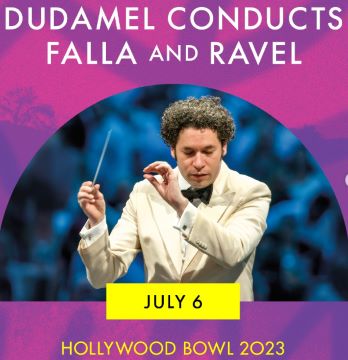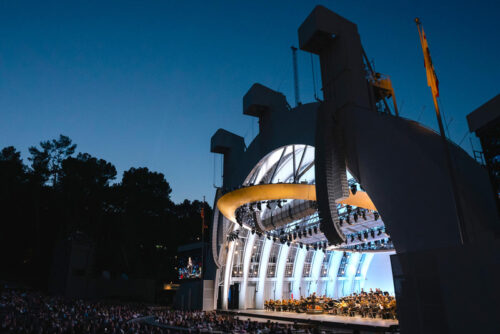A HELLUVA FALLA
There is something different – more beautiful – about the Hollywood Bowl this year. Immediately following the COVID shutdown, the audiences were becoming fairly unruly, including classical concerts. Even at a Joshua Bell concert last year, the crowd was talking, consuming loudly, and applauding throughout Tchaikovsky’s Violin Concerto whenever Bell would hit a high note. Yet my in my last two visits this week, the atmosphere feels more graceful and peaceful. It seems to me that people are taking refuge from the anger in the world, and are attending with community and rejuvenation in mind.
It was a major bummer that a staged version of Mendelsohn’s Midsummer’s Night Dream was cancelled for the July 6th LA Phil summer season opener at The Bowl, but the replaced program was splendid. On this chilly night, three new pieces were added alongside Manuel de Falla’s Nights in the Gardens of Spain with Javier Perianes as soloist.
Two of the selections came into my 7-year-old world when I saw Fantasia (1940) by Walt Disney, to whom I will forever be grateful for introducing me to classical music. The movie flopped financially and received very mixed reviews upon opening (that’s a fascinating story in itself); classical music was seen as so sacrosanct that Stokowski’s alterations and Disney’s characterizations were perceived as an insult to high-brow culture. But as proved with Dudamel’s stately interpretation of Mussorgsky’s original 13-minute tone poem Saint John’s Eve on Bald Mountain (written in 1867, but published for the first time in 1968), Stokowski’s adaptation of Rimsky-Korsakov’s version for the film is far more bombastic, scary, grand — and, for my money, rich. Still, Dudamel generated tremendous energy — smoldering, intense and withering. Individual instruments actually sounded like the characters Mussorgsky intended them to be.
Leopold Stokowski’s adaptation for Modest Mussorgsky's A Night on Bare [Bald] Mountain. Score. Leopold Stokowski Collection, Music Division, Library of Congress (001.00.00)
The other Fantasia piece, Dukas’ symphonic poem and scherzo The Sorcerer’s Apprentice, which closed the program, was even more exciting than the Stokowski version in the film. Stokowski was known for taking extreme liberties in his interpretations, far more than any conductor today would do, and made cuts, especially in the sequences with Mickey battling the Brooms. Here, maestro Dudamel and his amazing players (Whitney Crockett on bassoon!) worked up a good head of steam by the time they finished this highly popular music. It was luminescent throughout. With intensity and endurance and sheer power, the Bowl patrons were treated to a ruggedness and strength that truly impressed.
If there were a centerpiece of beauty in this program, it is Ma mere l’oye (Mother Goose) by Maurice Ravel, who began it in 1910 as a collection of five solo piano pieces; but when impresario Sergei Diaghilev asked him to write a new ballet, Ravel jumped at the chance of orchestrating his piano pieces and adding some connecting material, by the next year turning it into the ballet we know and love.
Although there are a number of good interpretations I’ve heard from the LA Phil, Dudamel’s rendition is most welcome. It was during this piece, especially the strings, that I noticed how great the sound has become at the bowl — it’s heavily miked but never over-amplified. Also, by placing the brass stage left facing inward, and the celesta facing inward stage right, the sound seemed better controlled by the conductor. Beyond the good sound, Dudamel does a fine job provocatively introducing and creatively developing each section, adding charm and excitement where necessary in a mostly dreamy, pastel-tinted performance. He handled the two concluding segments particularly well: “The Empress of the Pagodas” and “The Enchanted Garden,” which he positively drenches in color and atmosphere. Concertmaster Nathan Cole had a very interesting sound sort of rough and dark but very attractive during his violin solo.And let me add here, that along with a really savvy new haircut, Dudamel’s presence has become absolutely felicitous. Yes, he has three more years with the LA Phil before heading to New York, he will be sorely missed (there were many occasions during the show when patrons shouted out, “Don’t leave us, Dudamel!”).
Somewhere between a piano concerto and programmatic music is Manuel de Falla’s Nights in the Gardens of Spain, which was recorded by Javier Perianes in 2011, and he’s played it worldwide ever since. It’s essentially three nocturnes stitched together to create a bold and powerful work. The pieces are dynamic, resonant of Spain, but also filled with a sense of impressionistic classical music popular at the time it was written (between 1909 and 1915). Not as swooningly seductive as years ago, Perianes still offers remarkably crisp fingering reminiscent of Glenn Gould. It was very personable piano playing as well, nothing showy. (The piano solo encore “Danza ritual del fuego” — a movement of the ballet El amor brujo (The Bewitched Love) — was exquisite.)
The final movement, “In the Gardens of the Sierra de Córdoba,” the ending is neatly faded in and ends very delicately, in comparison to the large-scale orchestral writing that came just before. Perhaps this is why someone in the front boxes began applauding wildly before the piece ended, after which a laughing Dudamel — during bows — pointed in that direction to show Perianes the culprit. I think if that had happened at a concert hall it would have been disaster, but since it happened at the Hollywood Bowl, it was all in fun (although I fear we are headed in the direction of whoops and applause at any given time).


